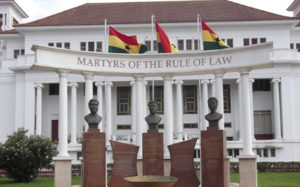Supreme Court dismisses Dafeamakpor’s interlocutory injunction
 The Supreme Court has dismissed an interlocutory injunction filed by Rockson-Nelson Dafeamakpor, the Plaintiff, who sought a restraining order to stop the Speaker of Parliament from approving some ministerial nominees.
The Supreme Court has dismissed an interlocutory injunction filed by Rockson-Nelson Dafeamakpor, the Plaintiff, who sought a restraining order to stop the Speaker of Parliament from approving some ministerial nominees.
The Court, presided over by Chief Justice Gertrude Araba Esaaba Sackey Torkornoo, said there was no basis to prevent Parliament from approving the President’s ministerial nominees.
The Court said it dismissed the application as an abuse of the Court’s process.
“I am sad to see that parties, who file suits do not sometimes follow up on the matter,” she added.
Initially, Mr Godfred Yeboah Dame, the Attorney General opposed to the application, indicating that it was an abuse of the Court process.
He argued that the plaintiff lacked standing to litigate on the points raised and requested that the application be dismissed.
Mr Thaddeus Sory, counsel for the Speaker of Parliament, told the Court that his client had not filed an affidavit in opposition to the application.
He said that the application did not meet any of the approval requirements and did not indicate that the plaintiff would suffer any repairable damage.
When the matter was called on Wednesday, March 27, 2024, Mr Dafeamakpor, the Member of Parliament for South Dayi, and his lawyer Nii Kpakpo Samoa Addo were both absent.
The Court asked about the plaintiff’s whereabouts and had to stop the case to confirm with the bailiff whether a hearing notice had been served on him.
According to the bailiff, who was under oath, a clerk named Naa at Addo, Addo Legal Attorneys said she had been instructed not to receive any processes related to the case.
The bailiff said after receiving that information, he left the hearing notice on the table of the clerk, indicating that the plaintiff had been duly served with the processes for hearing.
Meanwhile, the Speaker of Parliament and the Attorney General have confirmed they were duly served.
The Court also struck out an application for leave to amend the writs of Summons filed in the Court.
Source: GNA
